
TORONTO INTERNATIONAL FILM FESTIVAL 2011
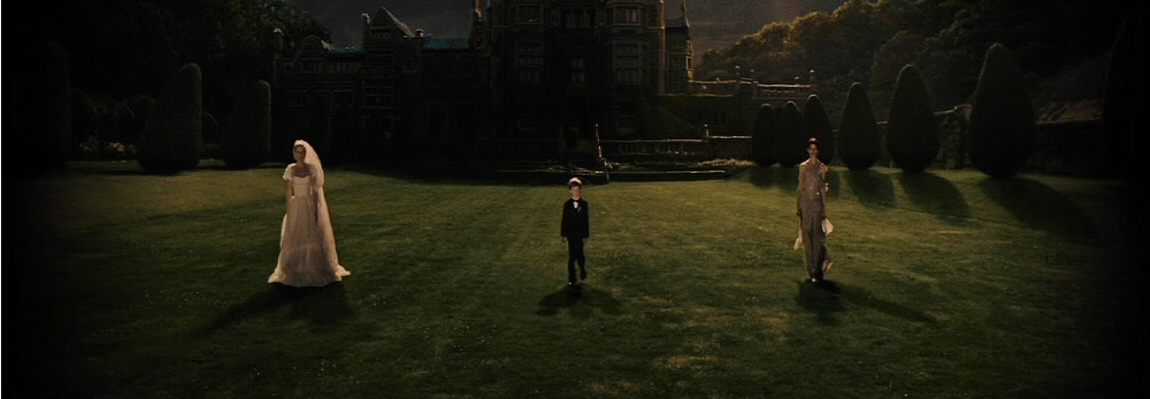
DAY ONE: A BRIDE, THE BARD AND BOWS & ARROWS
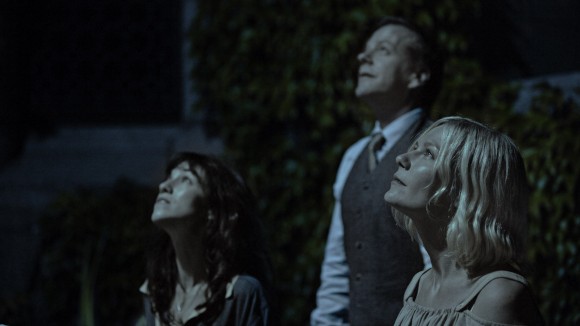
Melancholia.
JOHN: Lars von Trier knows what it's like to be depressed. He knows less about what it's like to be around a depressed person. I think that's why the first half of Melancholia is exceptional, and the second half is kind of boring. Not really boring per se, but just filled with the kind of super-stylized shots and pretentious posturing that made Antichrist such a chore to sit through. I want to give the movie a pass though, because Von Trier's suggestion that personal disaster, originating from the overbearance of social obligations and what other people expect from you, is more of a tragedy than the total devastation of life on earth is pretty well-handled. Most of the wedding sequence is great, from Kirsten Dunst's cleavage to an anti-marriage Charlotte Rampling showing up at the reception in an ugly shirt. There are a lot of good jokes and some bad ones (Udo Kier's sensitive wedding planner is funny once but not as a recurring gag.) Overall I liked it. What was really surprising was that I liked it more than Marcus, since he's a much bigger Von Trier fan than I am.
MARCUS: John's right in that I was very hard on (pause) all the directors I like that had movies screening at TIFF this year (Lars von Trier, Lynne Ramsay, Todd Solondz, Aki Kaurismaki, etc.) When I first saw Melancholia, outside of the opening sequence and the final shot, I wasn't all that impressed. It took some time but eventually I came around and wound up liking it very much. I loved the imagery and the visual effects as well as the music. I saw a side of Kirsten Dunst that I thought I'd never get to see (and I'm not just talking about her getting naked on camera, which wasn't all that impressive anyway.) Her transformation in the film reminded me of a less-frantic Natalie Portman in the last half of Black Swan. Kiefer Sutherland was surprisingly good, Charlotte Rampling was great as always and Udo Kier was funny too. Now that Lars has destroyed planet earth in Melancholia and got all the demons out of his system with Antichrist, maybe he can go back to finishing his "America Trilogy." On a side note, I was warned by John & Chris at the beginning of Melancholia (the first movie we all saw at the festival) that they play the same promos and trailers before every movie at the festival. I kind of laughed it off at first but they weren't kidding.
CHRIS: When I first saw Lars von Trier's new film at the very start of the festival, I assumed it would be one of the my very favorites of the week – but by the time we left Toronto, I wasn't even sure I liked it anymore. I'm not sure why I went from hot to cold so quickly on it but I think the problem boils down to this: the film is divided into two wildly unequal sections, the first of which focuses on Kirsten Dunst's awful wedding and the second of which looks at her sister Charlotte Gainsbourg's preparations for a massive asteroid potentially hitting earth. The first section works better but is fairly conventional and just not that interesting. The second section is occasionally a boring slog, but ultimately more original and rewarding. In short: the good parts of this movie are bad and the bad parts are good. It really set the tone for a festival dominated by "B/B-" films that fell into either the category of "better than expected but still not a masterpiece" or "not as good as they needed to be."
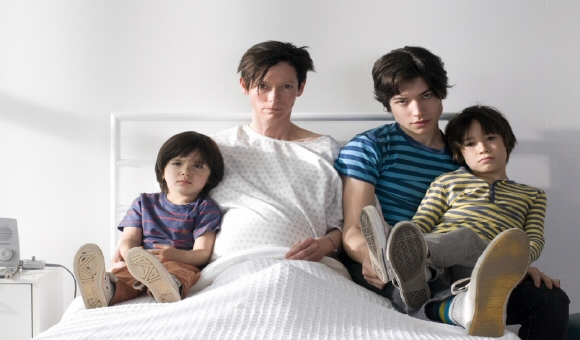
We Need to Talk About Kevin.
JOHN: This was my guilty pleasure of the festival. It was probably easier for me to enjoy it than those - like Marcus Pinn - who've been anticipating Lynne Ramsay's new movie for over a decade. Ramsay is definitely talented, but her visual storytelling is just not my cup of tea. For the first hour or so I couldn't stand her slick stream-of-consciousness editing or cardboard background characters (example: this one chews gum so she must be stupid and obnoxious.) But somewhere along the line, it all started to work for me. If you take it on faith that the entire movie is through the fractured perspective of Tilda Swinton's delicate, alternatively selfish and self-hating reluctant parent, everything comes together in a satisfying if not completely successful way. Most people's problem with the movie seems to be the Shining complaint - that the kid is too evil from the git-go, we never really see him develop into a remorseless school shooter. It's true: this movie has a lot more in common with The Bad Seed or The Good Son or Pearl Jam's "Jeremy" video than Elephant or Zero Day. I think that's on purpose - Ramsay is intelligent enough to know that kids aren't fucking scary, so she made Kevin into what someone as fragile and out of touch as Swinton's character would consider "evil." Seriously, if you consider that all of these memories are coming from Swinton, desperate to blame her son's violent act on some kind of intrinsic wickedness that was always there, it's a lot easier to take. Maybe it's just the parent in me...I get those vulnerable moments of simultaneous frustration, guilt and resentment that raising a kid can provoke. From the minute of his birth, Swinton becomes the target of an exaggerated psychological war waged by her son: things like lapses in discipline are presented as Machiavellian manipulation coming from a 3-year-old. The theme even ties in with Morvern Callar, a film about someone who refuses to be victimized and becomes an independent woman. Swinton is an independent woman - artistic, ambitious, yearning to travel - who can't help but be victimized whether it's the metaphoric hardships of motherhood or her post-tragedy life as the town's social leper. I'm pretty sure Ramsay only wants to focus on Swinton's warped sense of materal martyrdom and has no intention of explaining why things like school shootings happen or any interest in how Swinton deals with it afterwards. If she does, forget it. Literally, if you take the film at face value for even a second it all falls apart - so don't try. The one little item I thought was genuinely poignant was the idea that even the most positive experience you have with your child (in this case, it's bonding over a bedtime reading of Robin Hood) could indirectly lead to the kid's most violent tendencies (he uses a bow and arrow to kill his classmates...I'm not kidding, it's kind of amazing! Unless the bow and arrow are supposed to symbolize a gun, in which case forget it.) I'm worried about reading an interview with Ramsay where she punctures a hole in this theory of mine that the movie is intentionally campy and that Swinton is simply a woman who can't face that she never figured out how to deal with motherhood (although I did read a blurb with the author of the book who said she was curious about how the "unreliable narrator" aspect would be handled in the film, that kind of suggests that my interpretation isn't entirely off.)
MARCUS: (I missed the first 20 minutes.) I'm sorry but I guess I like Lynne Ramsay more when her plots are vague like in Ratcatcher and Morvern Callar. We Need To Talk About Kevin is her first film where she completely focuses on the plot and I was not impressed. It also didn't seem believable. If I'm not mistaken, we're supposed to take this movie seriously, right? You expect me to believe a mother lived in a house with a kid who did nothing but scowl at people for 16 years without EVER maybe taking him to a psychiatrist or anything? Tilda Swinton's character, who I started to find really annoying after a while, actually looked shocked upon discovering it was her son who was responsible for the high school massacre that takes place in the movie. Really? You lived in a house with Damien from The Omen for all those years and had the nerve to act shocked to find your son committed a mass murder. OH! Speaking of the mass murder... Kevin killed and injured a bunch of students with a...BOW & ARROW? Sorry but I don't believe that. Maybe he could have gotten two shots off, but seriously...someone just tackle him!!! When you film a high school shooting (or high school "bow & arrowing") and people in the audience are laughing (which I saw some people do), you've kind of failed.
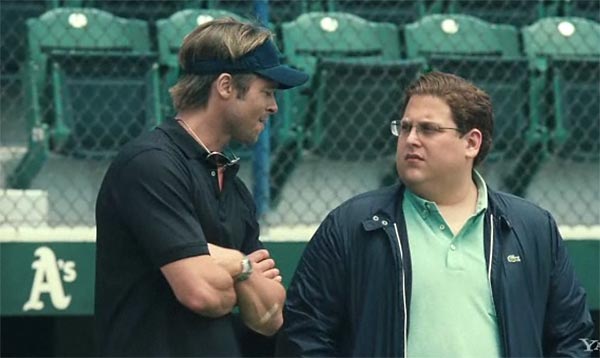
Moneyball.
CHRIS: Hey, look at this! Moneyball was much better than I expected it to be, but still a far cry from a masterpiece. It's charming and funny and if there is an audience member more solidly positioned than I at the crossroad of "film enthusiast" and "advanced statistical analysis in sports lover" then I'd love to meet them and discuss Philadelphia Eagles owner Jeffrey Luries' career as a film producer. This is pretty much what you would expect, a rousing underdog story where a mismatched group of losers that nobody believed in weather early tribulations before triumphing. It's genuinely funny though and, delightfully, doesn't skimp on scenes of fat people arguing about the meaning of OBP and the outmoded nature of bunts. Spike Jonze has a great cameo and folks I don't normally enjoy like Philip Seymour Hoffman, Brad Pitt and Jonah Hill are deeply enjoyable. Don't get too excited for it or anything – you can clearly see how original director Steven Soderbergh would have elevated it into the realm of greatness decisively beyond the effective mediocrity nailed here by Bennett Miller.
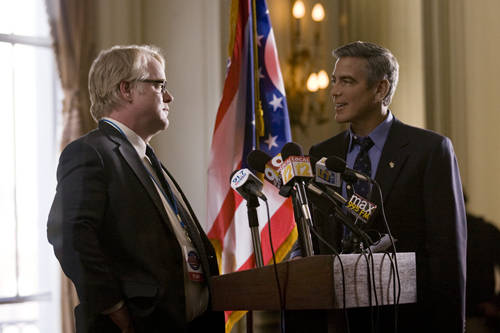
The Ides of March.
MARCUS: This was nothing super spectacular. It was just an entertaining political thriller with a great cast. And seeing Paul Giamatti and Phillip Seymour Hoffman in the same movie was kind of like a showdown between the two most prominent middle-aged, frumpy white guy character actors. I had no expectations going in to this and I walked away very pleased.
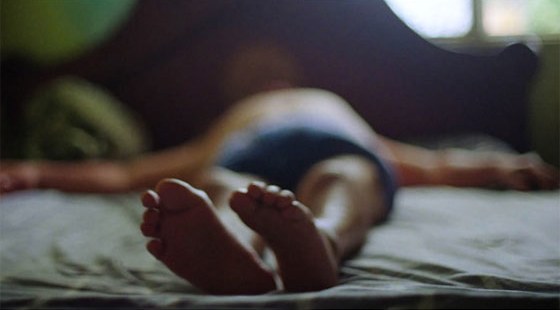
Porfirio.
JOHN: One of the most charming movies ever made about living a miserable life. Loosely based on the true story of "The Air Pirate," a wheelchair-confined man who hijacked a Bogota-bound passenger plane using two grenades hidden in his diaper, the movie deals with Porfirio's daily life of laying around his unadorned apartment, relying on his indignant son to wash him and clean up his poo and trying to get news of a clearly non-existent settlement from his lawyer (he was crippled by a policeman's bullet.) He also sells minutes on a cell phone, keeping it attached to a chain so nobody runs away with it, which forces him to not only sit and listen to people's inane conversations but to constantly inform callers that the person they spoke to isn't available at this number; he is a literal human pay phone. Yet somehow none of this is as crushingly depressing as it sounds, mainly because Porfirio - played by the "Air Pirate" himself - is such a winsome personality. He makes up little songs as he hangs around the house, occasionally enjoying fat-person sex with his bored neighbor, so unassuming and non-threatening it's impossible not to fall for his effortless charm. A scene where he arranges to buy the grenades from a street vendor is so casual it's comedic (an interesting parallel to the gun-buying scene from God Bless America, which we'll get to in a little bit.) The film also sets the record for longest amount of time the lead character remains shirtless (sorry, N!xau.)
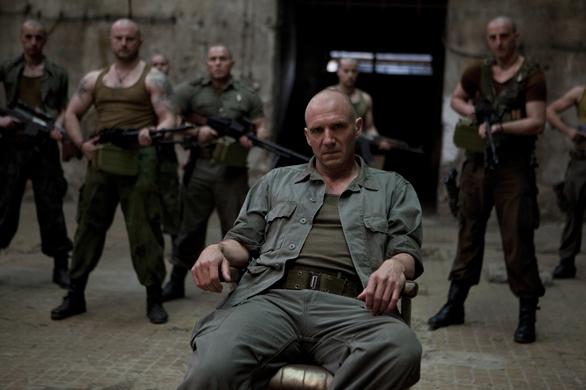
Coriolanus.
CHRIS: It's Shakespeare's tale of a jilted general who teams up with his arch-nemesis to wreak mayhem on Rome after being backstabbed by scheming senators, but – get this! – set in modern times. I think you will agree director Ralph Fiennes' special twist on the material is quite clever and original indeed. It's obviously not a distracting load of crap that's only part of the problem with a terrible film. Really, what do you want to hear about this one? Haven't you heard enough? Brian Cox is the only actor who comes close to making it work and lesser talents like Jessica Chastain and Gerard Butler are completely hung out to dry – they don't come close to finding a handle on two typically underdeveloped supporting characters who are none the less central to the plot. Also, Fiennes makes the mistake of attempting action scenes, which the debuting director ends up making about as pitiful as they come. The knife fight between Butler and Fiennes is cheesier than the one in the video for Beat It.
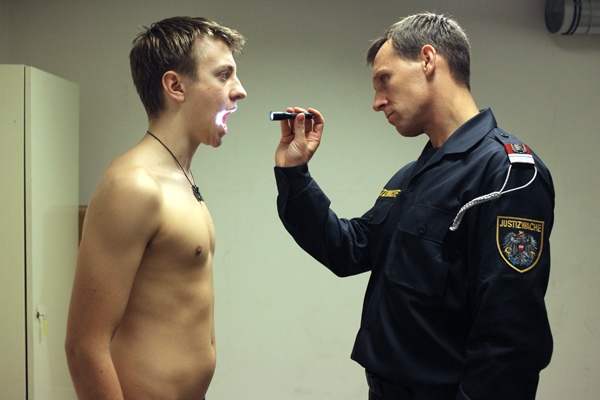
Breathing.
JOHN: I liked Breathing. I have nothing bad to say about it. It was an enjoyable film, but I'd hesitate to call it distinctive in any way. Following a 19-year-old who enters the sordid world of corpse handling (a condition of his daily parole from a youth center where he's been detained for three years after murdering a fellow teenager), this Austrian export owes more than a little to Kieslowski and the aesthetic make-up of post-Kieslowski Central European cinema. The actor is the sort of generic quietly angry young man one would expect to find in those kind of movies, his face a map of inner turmoil captured by an expressionist's camera. Flirting with the insidious while almost tumbling over the fence into sentimentality, the film ultimately settles for a vaguely uncomfortable feel-good vibe which goes down smoothly with no bitter aftertaste. Which may also be its problem...if the first-time director had made a decision to go either darker or lighter, he'd have a more substantial movie. As it is, the blending of challenging themes (a limited existence compared to the serenity of death) with cookie-cutter melodrama (hunting down an estranged biological mother) just comes off as "perfectly acceptable." Which is fine...I guess.
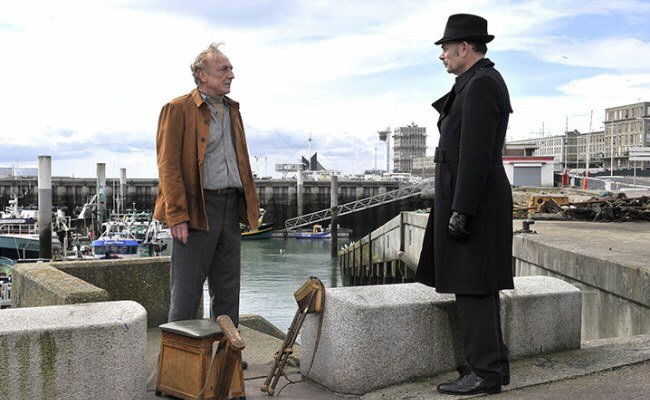
Le Havre.
MARCUS: After the disappointing We Need To Talk About Kevin, the long hike over to the theater that was screening this, eating a disgusting beef patty and having my ear talked off by some eccentric middle-aged Canadian women straight out of a Kids in the Hall sketch, I said to myself "this shit better be good." And it turned in to ANOTHER disappointment from a director I'm a big fan of. After the highly disappointing Shadows In The Dusk I wanted Aki Kaurismaki to have a hit, and this just wasn't it. I didn't think it was awful, but it was just typical run-of-the-mill Aki Kaurismaki: dry quirky dead pan humor, a poor down-on-his-luck leading man and bad Finnish covers of classic rock & roll music that I don't even listen to. The one thing this movie had going for it was the social commentary (La Havre is essentially a movie about immigration.) The problem is that immigration has been done to death (especially in the world of independent and arthouse film), so Kaurismaki's kind of late. The other problem I had with La Havre was that I sat next to a guy who overreacted to EVERY SINGLE THING in the movie. When something mildy funny happened he would chuckle extra loud and slap his knee. When something somewhat sad would happen, he'd go "AWWW, OH NOOO!" This made me not want to react to the movie at all.
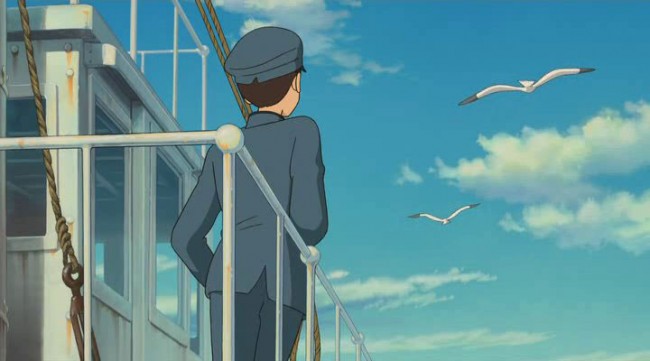
From Up on Poppy Hill.
CHRIS: Goro Miyazaki, son of the legendary Studio Ghibli founder Hayao, made a film that would best be described as "charming" if not for the fact that the plot hinges on incest. A studious teenage girl falls in love with the wild lead bad boy of her school in 1963 Japan and then they find out they actually share a long-lost father. It contains a scene in which she declares her love for him, incest be damned! But aside from all that, this is a warm and nostalgic film, modest and beautiful in every way – ok, ok, I'll fess up and mention that the incest turns out to be a misunderstanding and doesn't come close to submarining the movie. Still, it comes pretty darn close to wrecking the gentle "we’ve got to save our beloved rec center!" plot that brings our star-crossed lovers together. Features the most adorable scene ever of a violent riot breaking out at a high school debate. (Please note, this is a "good, but not as good as I wanted it to be" assessment. Even a touch of incest in your gazpacho and it'll instantly become cold incest soup.)
DAY TWO: SKIN, STORMS AND SPANKINGS
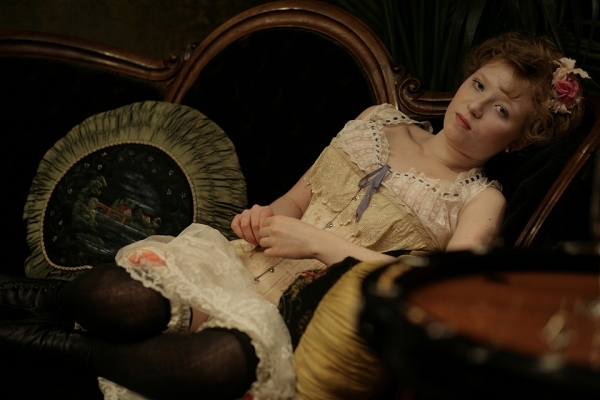
House of Tolerance.
MARCUS: By the time the festival was over, this was easily in my top 5 (maybe top 3) even though most people didn't really like it. I thought John, who left after an hour, hated it too until he cleared things up (and with all due respect the "plot," which is basically about a high class brothel closing down, doesn't really kick in until about half way in.) I know the topic of prostitution has been done a million times before (something a few different critics have noted in their negative reviews of this movie.) But House Of Tolerance has style. Sorry to sound so vague and pretentious but that's really what it comes down to. That and a cast of BEAUTIFUL French actresses (especially Iliana Zabeth who played the curvy, full-figured "Pauline.") I've got so many new crushes it's ridiculous. One of the first things I did when I got back to my bed & breakfast that night was google image/imdb half of the cast. Music was a key element in the House Of Tolerance. The score is so hypnotic and ambient. I loved it. I was reminded of the few good moments in Eyes Wide Shut as well as the recent French film Black Venus. There were so many memorable scenes: the freaky sex party scene where the "jewess" character (featuring joker-like scars on the sides of her mouth) is the main attraction and the "doll scene" where one of the prostitutes dresses up and acts like a giant-sized raggedy ann-like doll for one of the clients were two of my favorite moments. For a movie that was almost 2 hours and 20 minutes, I never looked at my watch once. I look forward to watching this again.
JOHN: I'm not as familiar with Bertrand Bonello as Pinn. Tiresia was ok and I like some of his shorts. I didn't see his last film, De la guerre, because it dealt with a character who gets locked in a coffin - I don't get involved in movies like that (same reason I skipped Shinya Tsukamoto's Haze and Rodrigo Cortés' Buried from last year's festival.) So I'm not sure how this one fits into his oeuvre, but judging it on its own, all I can say is that it gets its idea across without striking any new chords. There isn't much about the daily workings of Bonello's turn-of-the-century bordello that surprised me: the girls have a flippant attitude towards their marks, they share secrets of the trade with the newly-initiated (a product that helps take that nasty burn away, etc.) and find themselves being dehumanized - and in one case, disfigured - by the more dangerous clientele. I kept waiting for there to be some sort of hook, but the director seems satisfied to lounge around with his cast as they stroll about their operation of ill repute in and out of lacey undergarments. There's some sort of shady Dutch door balancing of wages going on between the girls and their madame (you need to pay off your debts, but to do so you gotta buy a fancy new dress to reel in the customers) that makes it clear most of the employees are bound to the house - an interesting angle, but not quite dramatic enough to get a good story going. I tolerated the movie for about an hour then left.
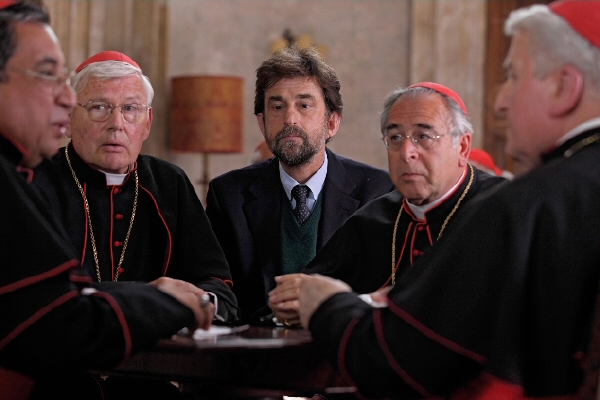
Habemas Papam.
CHRIS: A wacky pope comedy starring a surprisingly bloated Michel Piccoli and a surprisingly not-bloated Jerzy Stuhr from Caro Diario and Palombello Rossa director Nanni Moretti. I haven't really revisited Moretti's work since his heyday in the mid-90's when his quirky but still self-serious middle-brow comedies clearly weren't attuned to my snotty teenaged tastes (Snot taste? What the fuck am I doing here?), so I was pleasantly surprised that I didn't hate this movie. Again, it's not anything you should go out of your way to see and I wouldn't want to be accused of recommending it, but Moretti's handling of the story of a newly-elected pope who immediately plunges into depression and begins going to an atheist therapist is just fine, as far as that sort of thing goes. Moretti has always been accused of biting on Woody Allen and with a film like this, you can see why: it's the Catholic, Italian version of a Woody Allen short story. It has the same "not really intellectual, not really low-brow" tone mastered by Allen and the same unostentatious approach to direction. I guess I should mention that mental illness, specifically depression, was the running theme of the festival. This and Melancholia put depression to the forefront. I guess you can force Coriolanus in there, too. Fiennes is pretty bummed out when he gets the boot from Rome. The Pope doesn't team up with the Ayatollah to take down Rome in this one, though, which seems like a missed opportunity.
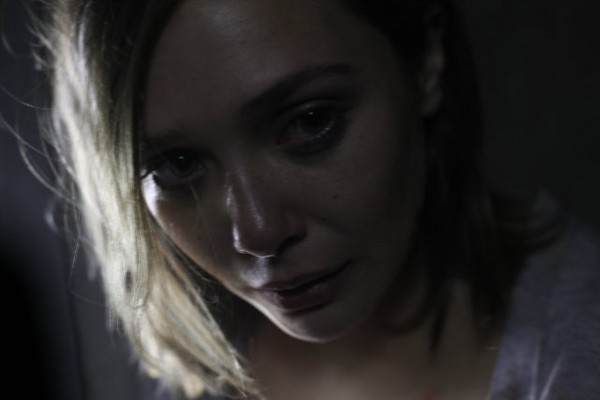
Martha Marcy May Marlene.
JOHN: This was a good follow-up to House of Tolerance. It also deals with women living in a commune, their tenure strictly voluntary but the longer they stay the harder it is for them to leave. Future ubiquitous movie star Elizabeth Olsen ("Girl in Car" from How the West Was Fun) takes it upon herself to leave but, although it's revealed through flashbacks just how predictably less-than-wholesome life at her Catskills Mountain cult compound turned out to be, the loneliness of the outside world proves to be even more unbearable. I was hoping that one of my favorite creepy actresses, Sarah Paulson, would be playing the den mother of this kooky cult but sadly she's the materialistic older sister Olsen retreats to; all she gets to do is chide Olsen for her whacky behavior. Melancholia's Brady Corbet does make his second festival appearance as the Tex Watson of the group, which is led by a brooding, unshaven John Hawkes in a recycling of his brooding, unshaven Ozarks methhead from Winter's Bone. Olsen does an ok job and is actually not bad to look at, sort of a combination of Vera Farmiga and Scarlett Johansson (with a little Maggie Gyllenhaal thrown in - hey, nobody's perfect.) Not a new classic by any stretch of the imagination, but I was impressed by how little it sucked. I don't want to give the impression that it was anything other than "fine"...please understand that I'm being much easier on it than House of Tolerance or A Dangerous Method because I had such low expectations going in. I would have liked a little more information about Olsen's life in the thrill kill cult, and I certainly would have preferred a better ending, but I liked the moments in the "normal" world that came off as unsettling as the most unsavory bits from her stint with the anti-shower squad.
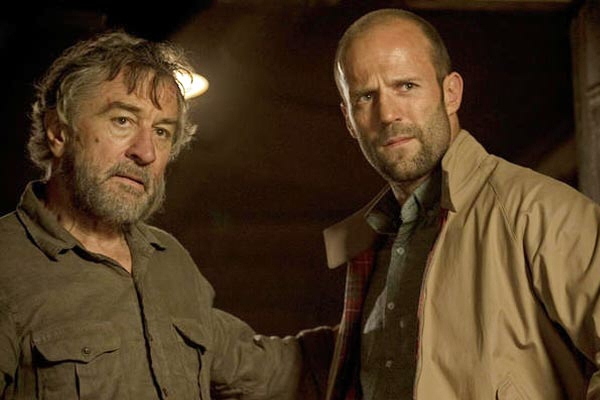
Killer Elite.
CHRIS: The reviews on this one have been pretty bad, but I totally enjoyed it. Statham versus Owen, including an excellent fight in which Statham is tied to a chair and another one which is a bare-knuckled blow-out that seems like it will end in a stalemate until Owen gets rocked in the testicles by Statham. Plus, Statham and his boys are hired to take down a cadre of SAS officers, which we can all get behind. Those scumbags killed Cooney's cousins, which is a true story. So seriously - fuck them. DeNiro is actually pretty darn likable phoning in his role as the comic relief sidekick who gets to do a small measure of face-beating/arm-snapping. His decision to keep some money "for expenses" at the end of the film is one of the many small touches that made me especially fond of what's a pretty routine Statham adventure. And I already thoroughly love routine Statham films. I'll mention here that this was the first of many screening that started wildly late. We weren't seated until almost an hour after the allotted start time, which royally fucked up my day and sent me down a track of seeing movies about which I was only mildly curious. In the past seven years of going to the festival, I never had a P & I screening start late and this year it was a chronic problem. Combine the delays with the irritating division of screenings between the Scotia Bank Theater and the Bell Lightbox and festival-going at TIFF was the biggest mess it's ever been. They've always been great up there, so I'll give them a mulligan. I just hope they get it sorted out because I'm not sure Brian DePalma (who I saw struggling down the street several times) can handle too much more of that shit.
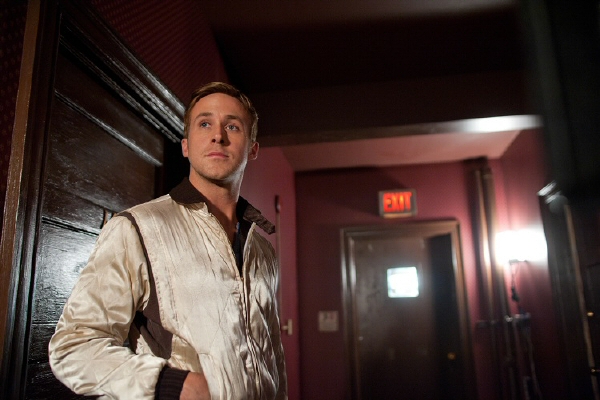
Drive.
MARCUS: Two great movies back to back. I already saw Drive (thanks to Chris) so you'd think I'd want to watch something else instead (I'm still annoyed at all the schedule conflicts from this year's festival.) A Dangerous Method was playing at the same time, but something told me it was going to be extra bland and according to both John and Chris my assumptions were right [spoiler!]. Drive just gets better every time I watch it (I recently saw it again for a third time on Sunday.) It references a few of my favorite movies and filmmakers intentionally and unintentionally, features a great cast and and awesome soundtrack by one of the best modern film score composers, Cliff Martinez. I know some of us have our difference in opinion about the lead actor being a bad-ass, but in my opinion Gosling pulled it off quite well. I've already said way too many things about Drive. I think I need to give it a rest (after I go see it one more time.)
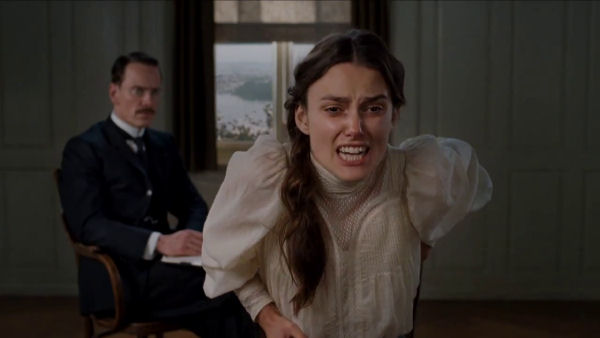
A Dangerous Method.
CHRIS: One of the early contenders for worst of the festival. Kiera Knightley is even worse than you might imagine and the last half hour is all just shots of Viggo and Fassbender staring at letters as voice-over of what they're reading plays. There's only one good scene showing what a nutjob Jung was in terms of his love of spirit world bullshit like astral projection and signs from the afterlife and Freud is developed very little beyond a surprising emphasis on his Jewish identity, which disappointed me: it's like the blandest possible portrait of three very screwy folks. Knightley's Sabina S. is a ridiculously over-acted mishmash of ostentatious ticks and childish psychology, a complete lack of both physical and emotional nuance. It's not just bad, but boring in the most conventional biopic sort of way, relying not only on the aforementioned letter-reading but characters summarizing their most famous philosophies and stating them point blank in casual conversation. It's all too way on the nose and simplistic. A new winner for Cronenberg's worst movie. Still not Fasssbender, Viggo or Knightley's worst, so there's that.
JOHN: "Is she supposed to be pretending to be crazy?" was my initial reaction to Keira Knightley's performance as Sabina Spielrein, her frantic spasms and teeth-clenching being the first thing we see in Cronenberg's new film. There seemed to be no other explanation for her blatant scene chewing except that she was trying to communicate that the character herself is putting on a show for her shrink, a Kevin Kline-lookin' Michael Fassbender as Carl Jung. But no, I guess that's just Knightley going off the rails of her own crazy train. Cronenberg doesn't have a reputation for directing actresses to great performances, but I'm still surprised he let her run off with the movie, which she does like an actual crazy person who shits all over a pile of papers and runs amok in the forest scattering them to the four winds. Not that Knightley's terrible acting even begins to represent all that's wrong with the movie. Whatever...it's the only thing I even have to talk about. Guess I'm just looking for someone to blame. At the end of the day, there's no reason A Dangerous Method couldn't have been directed by Stephen Frears, Agnieszka Holland, Nicholas Hytner, or any of those directors who helm bland period films based on boring plays that claim to be pushing some kind of theatrical envelope. Fassbender, Freud, Cronenberg...you'd think this thing would be sexy. Instead it's as tame as they come: very methodical, but never dangerous. I'm not demanding that Freud grow an anus in his forehead or for Jung to mutate into a giant, festering mealworm. But if all you've got in terms of tantalizing kink are some mild spanking sessions, a minor cheek wound inflicted during a lover's spat and Vincent Cassel gropping a bored-looking fat chick, I don't even know who you are anymore, David Cronenberg. You and I should sit down and talk about it...
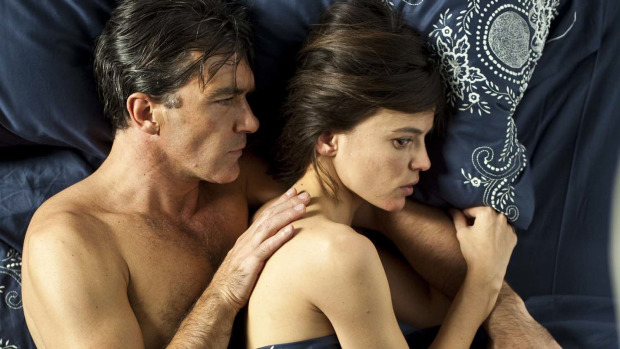
The Skin I Live In.
CHRIS: The first happy surprise of the year: I don't like Almodovar in general and I haven't liked a specific Almodovar film since Talk to Her, but this new one starring Antonio Banderas as a deeply depressed doctor performing medical experiments on a captive patient worked for me. It helps that the female lead, Elena Anaya (who has actually been in a ton of stuff that I didn't remember her from), is luminous, gorgeous and constantly naked. They seriously must have digitally enhanced her skin because there's not a single flaw to be found anywhere on her perfectly smooth, milky white body. That might sound creepy, but the main subject of the film is in fact her flawless, sensual body, so I get a pass. Hell, Almodovar demands that you ogle her – he's setting up the audience for one of his typical provocative tricks, but even if you see the twist coming a half an hour before it's revealed (like I did) the movie works for Banderas and Anaya's performances and Almodovar's atypically stylish and self-assured direction (because he's basically incompetent in films like Volver and Bad Education.) This movie is going to get both rape and transgender activists all riled up, but it's more than cheap titillation and smug bad boy auteurism. Ultimately, a little too thin and gimmicky for me to go completely bananas for it, but it's probably my favorite Almodovar film ever. Banderas? I love that dude.
MARCUS: This is another one like Melancholia where I needed more time to decide if I liked it or not (and I'm still kind of deciding.) It seems like the older I get, the less I like Almodovar's recent work. Broken Embraces was ok, Volver was "meh" and Bad Education seemed like it was made just to be shocking with all the pedophilia and transsexuals. The Skin I Live In had plenty of Almodovar's unique feel to it, but was still somewhat enjoyable. I'm still a little confused by certain aspects of the story and it seems like the Antonio Banderas' motivation to get revenge on the man who traumatized his daughter got a little clouded halfway through the movie. The Skin I Love In felt like The Bride Of Frankenstein meets Oldboy with a heavy dose of Almodovar.
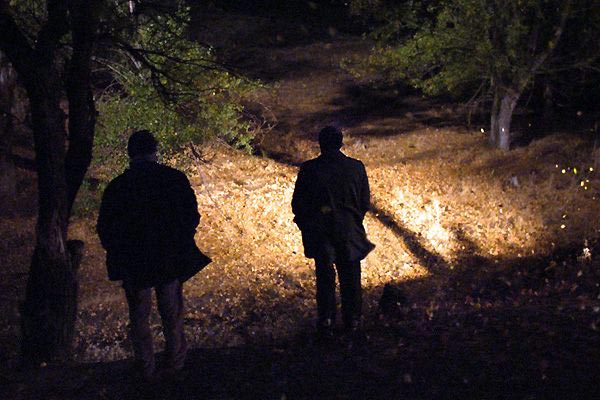
Once Upon a Time in Anatolia.
"A roller coaster ride for people who hate roller coasters!" - John Cribbs
JOHN: Nuri Bilge Ceylan has gotten better with each film, and this is his first great movie. I'd say only three important things actually happen in the film, but it's made up of hundreds of moments that reflect the feeling you get when you step out of a loud club into the open city night, or the sense of being out in the unlit country with friends watching them vanish and reappear from the darkness. Most of it feels like the scenes that take place between transitions of a straight film: lots of waiting, awkward silences among strangers, nuances expanded into epic events - intimate, wearying, funny. It's possible to allow twenty minutes of the movie to go by without expecting anything, then become engrossed in an abrupt sense of urgency that puts you right into a scene with the characters. The plot - concerning a police convoy escorting two murder suspects through Southern Anatolia searching for a dead body over the course of one long night - isn't overstated, but the activity of nature is. The movement of grass is sinister, the night air is anxious, as if these characters are intruding on the reposing landscapes with their cars and flashlights. The film has been compared to Tarkovsky but, while I understand the similarities, I'd say Ceylan is more from the same school of obscured observation and subtle exposition as somebody like Michael Haneke or Lucrecia Martel: the cinema of lucid abstraction.
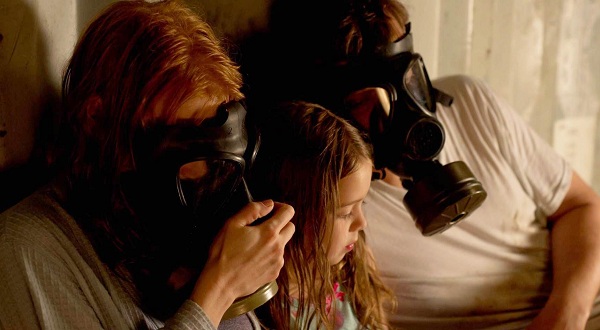
Take Shelter.
MARCUS: Let it be known that this was one of the few movies at the festival that all three of us agreed on. This was awful. Just awful. While watching Take Shelter I threw my hands up in an "I give up" gesture more than once. The only I reason I stayed for the whole movie was because it just kept getting worse. I wanted to see how far it would go. I don't want to repeat too much of what John and Chris have said, so I'll just leave it at that.
CHRIS: Hm. I saw two of the contenders for worst of the festival within a couple hours of each other. Michael Shannon plays a deeply depressed construction worker who starts having visions of the apocalypse. Is it schizophrenia or are the portents real? How about both? The film doesn't seem to have figured it out. Basically, a bunch of jarring dream sequences in which his deaf daughter is put in danger interspersed amongst endless scenes of Shannon brooding while friends, family and coworkers look on with fear-tinged skepticism. The perpetually overmatched Jessica Chastain plays his concerned wife and lady who really should have gotten him to a doctor much, much sooner. Sometimes, unconditional support for your husband is just stupid. Just an awful, boring movie that really makes me question my unwilling to use the phrase "tedious, pretentious horseshit." Shannon, in danger of becoming the male Vera Farmiga, once digs into a role really not worth his stellar efforts.
JOHN: The question of whether Michael Shannon is certifiably nuts or experiencing real visions never even occured to me watching William Friedkin's Bug, so engaging were the direction and performances. But Jeff Nichols seems like he wants you to figure out whether Shannon really is seeing visions of apocalyptic storms carrying motor oil rain that turns people into crazies. His entire movie ends up hinging on this outcome, even though every scene of birds swarming and crowds of people attacking is promptly followed by a sweaty Shannon jerking upright in his urine-soaked pjs. "He's the storm!" seems the obvious answer to this tedious procession of phony threats. "He's driving the people he cares about away and destroying his life! He is the storm!" Credits roll, followed by my eyes. However, Nichols appears to have second-guessed himself and offers an alternative ending that makes even less sense and negates what semblance of story he's managed to developed over the film's interminable running time. Take Shelter clearly wants to be a Red Desert/Safe-style environmental terror-as-metaphor movie, but it comes off as more of a rip-off of The Rapture that forgot to include a single character worth caring about. Will the little deaf girl be hurt? Honestly, who gives a fuck. The movie aims high but suffers all the more for its very obvious low budget - ironic, since a major part of the plot is Shannon breaking the bank to buy and bury a storage container, which the filmmakers also undoubtedly had to fork over money for. Still, I don't think I hated it as much as Chris and Marcus...I at least admire the effort. I don't know if it was quite the worst film of the festival, but it was absolutely the most overrated (by everybody but us.)
DAY THREE: MONKS, MANIACS AND MASS MURDER

The Descendants.
JOHN: This started as a bummer of a day that slowly got better and better right up to what is probably the best movie I saw at the entire festival. But this was certainly the low point, which started with me waiting over an hour in line for a movie I didn't even want to see. This is the first year I can remember there being such inexcusable disorganization. More than one movie started late, throwing off my schedule for the rest of the day, forcing me to watch the goddamn 50/50 preview that played on tv's in the theater lobby over and over again and one guy on line tried to touch my balls. I won't say who it was, but he's a very prominent North American film critic with an alliterative name who apparently thought he was "on the town"...anyway my point is, it's all the festival organizers' fault. Oh wait, Chris already complained about all this? Well, serves you right for wanting to read about Alexander Payne's new movie. It's pretty much exactly what I expected: another White Man in Crisis situation comedy milked with Alexander Payne's typical flair for general condescension and unearned sentimentality. From the first shot of a woman in a coma lying in a Hawaiian hospital, I was able to immediately deduce: She's rich landowner George Clooney's wife, he's going to find out she had an affair with somebody and have a funny, touching meltdown in front of her unresponsive vegetable of a body, then set out to confront her lover to find out more about his own shortcomings. What I couldn't predict was that - Are you ready for it? Put down that drink or it's coming out your nose - get this...he runs down the street with flip-flops on! Holy shit, can you believe that? Comedy gold right there. Payne recently said that nobody makes "adult dramas" anymore. It's true: instead, they make unfunny comedies about stupid, self-absorbed American assholes the director clearly hates who have a beguiling moment of redemption in the hackiest of Hollywood climaxes. The crowd seemed to love the movie though, I'm sure it will be a hit.
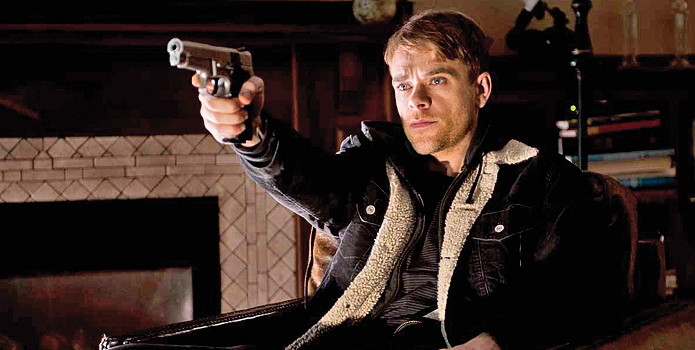
388 Arletta Avenue.
CHRIS: Since The Descendants was delayed, I ducked out of line for that and headed into this ultra-cheapo thriller, a Paranormal Activitytinged "all footage from home-video cameras" void of a movie starring that void of an actor Nick Stahl. One of those rumble/enter films where there's a low-rumbling (and some discordant high pithced noises) on the soundtracks as a character slowly enters an ominous setting but then nothing really happens. Maybe there's a call from another room or a strange sound from the basement, the character is jolted and then must slowly enter that room as a low rumble plays on the soundtrack. Mia Kirshner plays Nick's wife; she disappears and then all manner of low-grade, uninteresting weirdness begins to happen like phone-calls with nothing but heavy breathing and, whuh-oh, where's the cat? What was that sound upstairs? Rumble/enter. Repeat. The ending is one of those en vogue "sick" twists that actually makes absolutely no sense and would be impossible for the villain to pull off. Sadly, that ending is the only memorable aspect of the film.
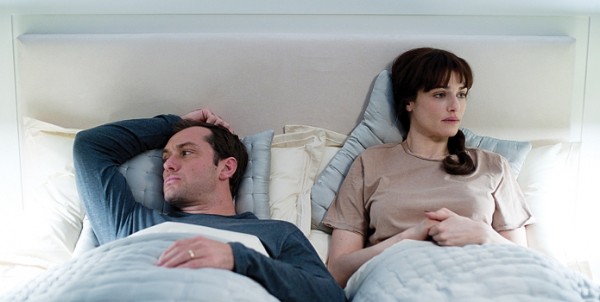
360.
MARCUS: I saw the first part of 360 before Carre Blanc but I didn't even make it to 40 minutes before walking out. Part of me still likes the multi-layered, multi-character, intertwined plot films (when they're done right) and part of me hates them. Plus I wasn't even really paying attention (I was still waking up...and I almost went right back to sleep while watching Carre Blanc.) Sometimes a movie trailer is cut so well and mixed with really great music that it just hooks me. I had high hopes for this but unfortunately this was very disappointing.
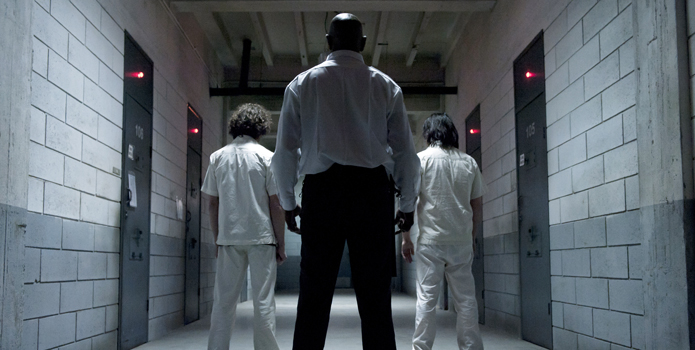
The Incident.
JOHN: A low budget version of Alone in the Dark that never leaves the asylum, starring an unappealing guy whose background is that he has a girlfriend and plays in a band. Following an incident at the looney bin where the inmates stage a rebellion and begin hunting down our greasy hero and his cooking staff (who, weirdly enough, seem to outnumber the orderlies), the movie displays no real innovation: if they catch you, they kill you. That's it, please retrieve your brain at the door on your way out. While it did set a festival record for most heads being bashed into a wall, it was a pretty good example of the overall lameness of the genre films that turned up at this year's fest. I overheard someone mention that the Midnight Madness selections had been a collaboration between the TIFF people and the Ain't It Cool News team, which makes perfect sense. This is just the kind of unoriginal drivel that gets overpraised by those guys all the time. In other news, two people were apparently taken away by an ambulance at a screening of The Incident after fainting during a scene where one of the victims is burned alive atop a stove. Were these two dudes plants or something? That moment is an ineffective bit of gore that is nowhere near as gross as anything in a movie like Martyrs or something, and it happens to...I couldn't even tell you which one it was, the main characters run together. The rumor sounds pretty shady to me, but if it was a stunt I guess I can appreciate the effort (hey, I said something nice!)
CHRIS: Geez, maybe I telling tales outside of school when I said that the festival was dominated by "B/B-" films because here we have another F. Maybe an F+. A trio of rockers/cafeteria workers gets trapped in a prison for the mentally deranged during a power outage and that’s as far as the filmmakers seem to have thought it through. There’s actually an interminable half hour of set-up where we're treated to not a scene of an abortive recording session (that mainly focused on getting drum mic levels correct) by a sexy bedroom scene of the lead rocker’s school-teacher girlfriend grading papers. Once chaos reigns at the asylum, there's not much too it beyond "blaaarrghy-blargh" style crazy dudes beating, stabbing and skinning the overwhelmed security staff and each other. The mid-80's setting seems to exist only as an excuse for no one to have a cell-phone. Also, the police are quickly contacted, it just takes them over two hours to arrive. "Riot in the prison for the criminally insane with several folks murdered? We'll be there when we can. In the meantime, try not to get slathered in honey and assaulted with a potato peeler." Boring, stupid stuff – normally the most consistently excellent section of TIFF, Midnight Madness was a real super-dud this year (excluding God Bless America, which I'll get to in a bit.)
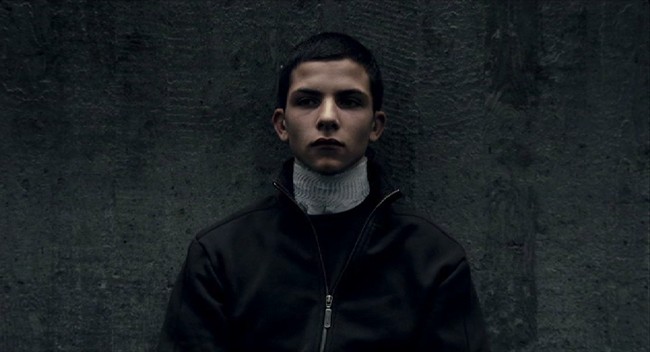
Carre Blanc.
JOHN: Croquet and cannibalism are the order of the day in this dystopian black comedy that I would probably never have given a glance if Marcus hadn't pointed out the impressive-looking trailer. I think we were both disappointed by the film, a show-offy, clever, largely inoffensive but not very original mishmash of ideas that feels like Delicatessen without the visual flair. It's the kind of arthouse sci fi that avoids genre trappings by scaling the concept down to actors talking in a room, effectively turning the movie into nothing. Multiple scenes of torture and humiliation carried out in remote sparsely-designed by corporate sadists and off-screen suicides are followed by corpses being carried to a meat wagon for processing to create food for the populace...the weird thing is, there are so few actors hanging around the empty sets, you begin to wonder why they need to revert to turning folks into hamburgers. It doesn't look like an overcrowded world. But again, the movie has no interest in explaining itself or its familiar set-ups. On the plus side it doesn't look bad and has an nifty sound design, but I only made it halfway through the sluggish 80-minute running time.
MARCUS: My biggest issue with Carre Blanc, a movie about a suicidal married couple trying to hide their emotions in an odd futuristic dystopian society, was that there was actually a GREAT movie hidden somewhere beneath this knock-off big brother/George Orwell/Kafka-esque B.S. I get it. We're all slaves to our jobs in this capitalist society, and we're just working our way to an early grave, maaaan. Got it. Tell me something I don't already know. I'd rather watch The Seventh Continent (a much better film that deals with the same.) I should've known the Tarkovsky comparison that Carre Blanc got was inaccurate. It's beautiful to look at, but after a while that started to wear off and I wanted more. Carre Blanc did feature some nice haunting voice-over narration and a few great scenes (a waiter being kicked to death by a group of businessmen for spilling a drink on one of them while people pass by and go about their business as if nothing is happening), but I still found myself checking my watch more than once (which is bad because Carre Blanc is barely 80 minutes long!)
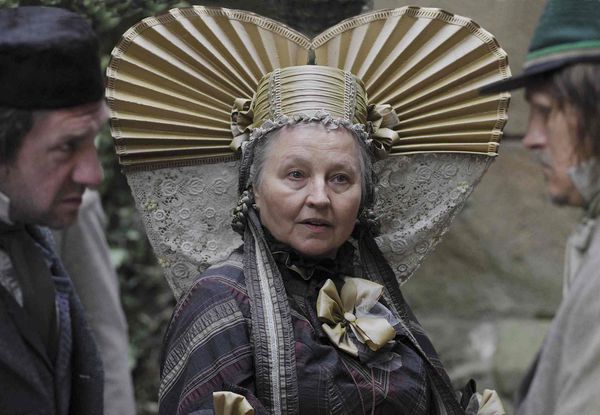
Faust.
JOHN: Russian cinema in general has left me cold over the last 20 years (get it? It's cold in a large part of Russia.) Last year's The Edge, which won some Russian movie awards, was just sort of bizarre and uninteresting. While we were at the festival, it was announced that Sokurov's film had taken the big prize at the Venice Film Festival (it apparently made Darren Aronofsky cry), but its immense length didn't fit in with my schedule so I only snuck into it for a little over 20 minutes. I can attest that those 20 minutes were fine, although there was nothing of the imagery found in Svankmajer's or Murnau's take on the popular legend. Bruno Delbonnel photography didn't blow me away, but it was interesting to see that Sokurov added some Strauss to the soundtrack while also borrowing elements from Thomas Mann's Doctor Faustus. I did luck out in that the scene I came in on was the introduction of the girl playing Gretchen, a real cute Anna Geislerová-esque redhead (she's blushing in a bathhouse while the laundry girls chuckle at Mephisto's penis being on his butt.) Pinn saw the entire movie later in the festival, so I apologize for this very unhelpful synopsis and suggest you check in with him later down the line.
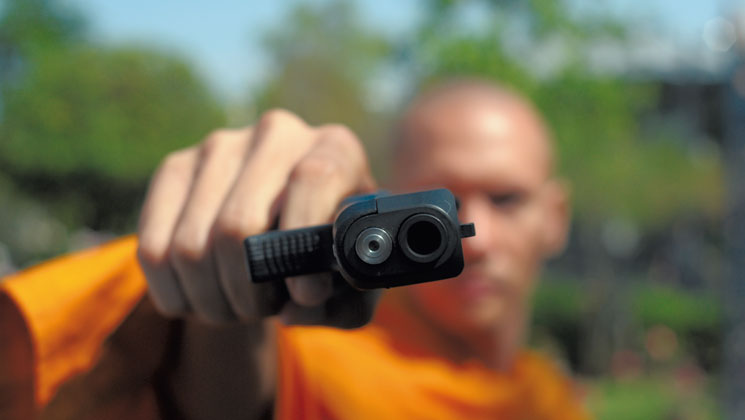
Headshot.
CHRIS: The film seemingly made for me: a languid, existential action movie featuring 2 dynamite, just smoking gorgeous, tawny women. The gimmicky is that after a corrupt system fails him and his former prostitute wife dies of a drug overdose (and really I cannot overstate how breathtakingly gorgeous she is), a good cop pushed too far is recruited to join a secret society of killers that take down the evil men of this world who have gone unpunished. One such assassination goes bad, ends up with a bullet in his brain and decides to retreat of a life of solitude of a monk. Unfortunately, he can't stay retired when violently pursued by the son of a businessman whose teeth were righteously blow through the back of his skull. The villains are nasty, the hero a gentle bad-ass, the women are stunning, the action is compelling, it hits the marks of any great action film, but with the added bonus of being moody and contemplative, a true work of aesthetic greatness combine Asian long-take cinema’s powerful sense of location with Brakhage-inflected, Diving Bell and the Butterfly-style depictions of the spiritualist hitman’s post-head-trauma visions of a world turned literally upside-down. Mark it down, fellas ("fella? This guy says 'fella?'"): one of my Top 5 of the festival and the current odd-son favorite for Best Action Movie of 2011.
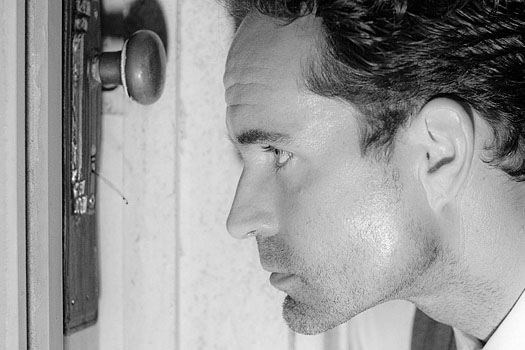
Keyhole.
JOHN:I gave Guy Maddin even less time than Sokurov. I want to like the Winnepegan (Manitoban?), who is clearly influenced by filmmakers I love and is the most popular director attempting to recreate the aesthetics of silent cinema, experimental film, surrealism etc. But his stuff feels like...a TV show. I don't know. The camera he uses does not make me think of old films, except that I wish I watching one instead of this Guy Maddin movie. He's not smart or funny enough to take those tools and use them in a way that's interesting: watching this movie, I got really really sad remembering how George Kuchar is no longer with us. I am glad Maddin seems dedicated towards casting every Kid in the Hall (Kevin McDonald is in this one) - I think that's even better than getting Ann Savage to do your movie. Maybe Maddin wants to buy the serial killer vehicle Chris and I wrote for Bruce McCulloch? Nah...he'd only gunk it all up.
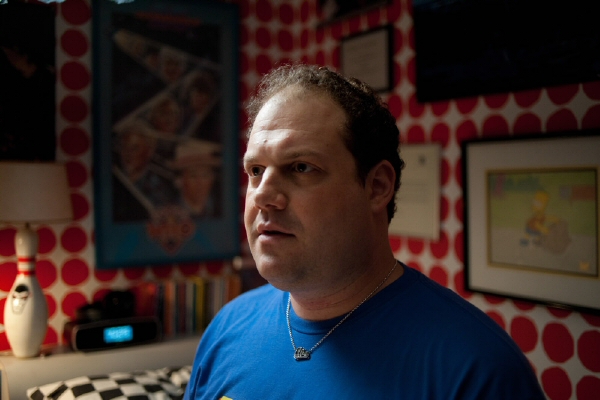
Dark Horse.
MARCUS: Just like We Need to Talk About Kevin and Le Havre, Dark Horse was another movie from one of my favorite directors, Todd Solondz, that didn't WOW me like I wanted it too. This isn't his best work, but it isn't his worst. I personally think it's his best movie since Storytelling, although most people at the festival thought it was his best since Welcome To The Dollhouse (which I couldn't disagree with more.) Dark Horse did have quite a few flaws (not as many as Life During Wartime but a lot more than Storytelling.) It wasn't even 90 minutes long but I must have looked at my watch at least three times while it was playing. Dark Horse couldn't come to a conclusion and there were some unnecessary characters. It didn't feature some of Solondz's key themes like pedophilia, rape and semen but it still featured his other signatures like dream sequences, the blur between reality and fantasy and the classic "Todd Solondz loser" character in the same vein as Paul Giamatti in Storytelling or Phillip Seymour Hoffman in Happiness. As attractive as Selma Blair may have been in Dark Horse, after a while her character did get annoying. Making a depressed character like hers can be difficult because sometimes they come off so depressed that you start to not care about them. By the end of the movie I just wanted her to stop talking with that annoying apathetic/nasally voice.
JOHN: "I never dance at weddings," Abe tells Miranda, a stranger sitting at the same table. Abe doesn't take risks - he doesn't stray from his comfort zone, which happens to be his parents' house and his father's office, where he sits around waiting for the friendly secretary to finish his work for him. This dark horse has built himself a stable lined with mint-on-card action figures and Doctor Who posters from which you get the feeling he rarely ventures and where he seems more than happy to exist, fat - charisma-free and without ambition - until the day he dies. But in making contact with the beautifully sad Miranda, he's taking the first step towards making a change in his life, which Todd Solondz mockingly suggests is a dangerous thing to do - he'll end up getting an STD and dying! This is the first Solondz movie I felt had much of anything to it since the Dollhouse days, and the best scenes are the ones between the aggressively optimistic Abe and the defeated Miranda, who has so little life left in her that she's willing to give herself to this deluded loser ("I want to want you!" has got to be the best line of the festival.) I'm glad Solondz stripped things down and followed one main character (played by one actor, though sadly not Artie Lang) in his latest film...I just wish some of the additional material worked. There's a successful brother figure lifted from Step Brothers, the kind of one-joke foreign character found in an Alan Ball script, a cougar whose personality seems lifted from an SNL actress...did the director feel he had to compensate for the lack of his usual provocations by adding a bunch of goofy side characters? To be fair, Walken plays Abe's dad absolutely straight, despite wearing a bad wig - I was actually a little scared of him. The last 15 minutes are a fumble of half-conceived segments and abrupt stops and starts that absolutely nose-dives the movie (the last line should have been "Strange...I feel like dancing now.") Honestly, it might have been better, even brilliant, as a short. But hopefully people will be into it enough to inspire Solondz to come up with a more solid one next time.
Incidentally, Pinn? On the imdb cast list, Selma Blair is listed as "Miranda (former 'Vi')." So maybe she is supposed to be her character from Storytelling? I can't recall any line in the movie where she says she used to go by the name 'Vi'
CHRIS: Another surprise: I liked Todd Solondz's new film, the story of a petulant fatso who capitalizes on Selma Blair's self-hatred to enter into a particularly depressing engagement. It's not a reinvention for Solondz, it's not even slightly new territory, but he's excised the rape and incest and murder and pedophilia, which gives the movie a feel of creative rejuvenation. It's every bit as misanthropic and pessimistic as his other work, but thankfully free of the tired shock value schtick that made his recent films feel like they had completely run out of ideas. It's a fairly simple story of an overgrown man-child who collects Simpsons and Doctor Who memorabilia and the pathetic parents played by Christopher Walken and Mia Farrow who enable him. His ridiculous romance with Selma Blair is contrasted with his sad fantasy life revolving around his dad's homely secretary, a motherly spinster who would actually be a far better match for the all but helpless loser who still lives in his childhood bedroom. Not a homerun - the last twenty minutes are a mess of simplistic, tiring dream sequence that add little the film beyond the minutes required for a feature length running time. It also fails to develop beyond the characters and themes as they are laid out in the first 20 minutes, so in retrospect the experience is thinner and less satisfying than it feels while you're still taking it in and enjoying the miserable comedy. Still, it's funny, sad and depressing without the cheap shock; I honestly didn't think Solondz was capable of delivered something like that anymore.

Smuggler.
John Cribbs: Wow Pinn, You really don't like those extreme Japanese movies.
Me: Nope, I don't.
MARCUS: Sometimes these modern Japanese movies go from being completely silly to over the top violent to dramatic in a matter of 10 minutes. I hate that shit. I can never decide if I'm supposed to take these movies seriously or not. Not to sound like an old man, but they just make me dizzy. I didn't know what was going on at all in this movie. I dunno, I couldn't get in to it. I'll let John take this one...
JOHN: Common in modern Japanese films are circumstances that bring a ragtag group of characters together and, of course, an onslaught of dizzying comedy and extreme violence. Katsuhito Ishii is one of the more expert craftsmen of these elements, most notably in Shark Skin Man and Peach Hip Girl and Party 7, and manages to tackle very relatable issues... he just prefers to explore them through outlandish gunfights, weird sex, role-playing torture sessions and lots and lots of blood. Smuggler features a great peformance by Mystery Train's Masatoshi Nagase and decent work from Satoshi Tsumabuki ("Exceedingly Handsome Guy" from Tokyo Drift) as an aspiring actor who, through a yakuza-based misunderstanding, is forced to join Nagase's clean-up team. They usually handle corpses (like in Breathing, only on the sly), but their newest delivery is the colorful assassin Mr. Vertebrae, whom they must deliver to a rival gang seeking revenge for the beheading of their boss. It goes without saying that this is all super-cool (especially the final stand-off between Nagase and Vertebrae: "A hand for your life is a small price to pay!"), although what I find really resounding is Ishii's bizarre approach to character development: you learn more from two characters beating the hell out of each other or fighting over the best way to dispose of a body than in the pages and pages of boring exposition from most movies. In another year, this would top the list of Asian entries...but at this festival, loaded with great films from Japan, Korea, China and Thailand, Smuggler is awarded an enthusiastic "also-ran."
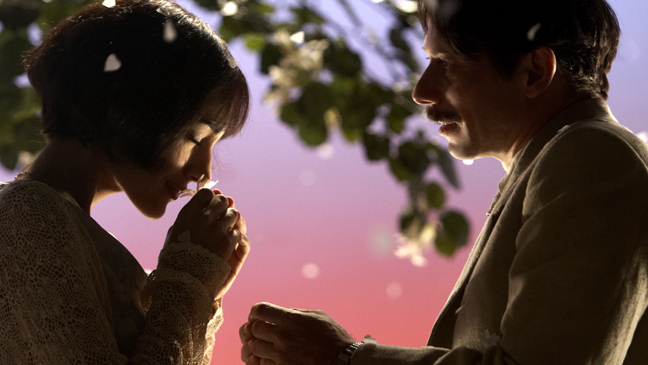
Chicken with Plums.
CHRIS: The (sorta) live action debut from the co-directors of Persepolis, Matthew Almaric stars a world-renowned violinist who decides to simply lay down and die after he can't find a satisfactory replacement instrument for his recently destroyed violin. Satrapi and Parranoud's use of animation, cartoon-ish set design and exaggerated visuals recalls the best of Jeunet and Caro, but with a more wicked sense of humor, skeptical intellectualism and spiritual darkness that you'd never find even in their darker movies like Delicatessen, let alone Amelie or A Very Long Engagement. Even if it seems like a contradiction with what I just wrote, Chicken with Plums manages a sweeping, shattering romanticism that compares favorably to even the tear-jerky of classic Hollywood melodramas. But those laudatory comparisons diminish the film: this is the true original of the festival, a film unlike anything you've ever seen and even more of an artistic bolt of lightning than even the duo's startlingly original Persepolis. Maria de Medeiros, as Almaric's wife, finally has found a role that will erase her designation "the pancakes chick from Pulp Fiction" and Almaric confirms that he rules. You'd have to be missing both a brain and a heart to not like this movie. Shit, I saw some good movies, if this isn't my favorite of the festival. It's Top 5, but maybe not even Top 3.
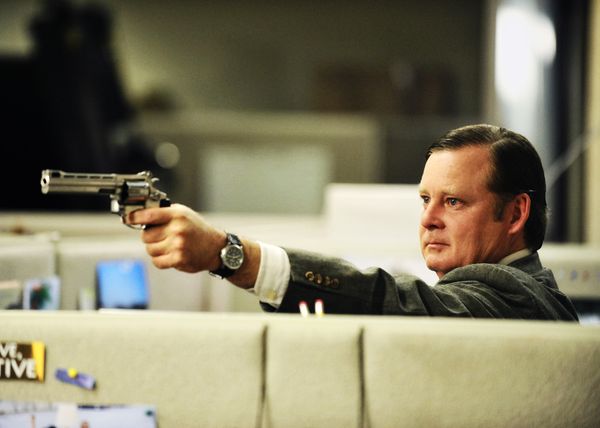
God Bless America.
CHRIS: Speaking of what was my favorite, this could be it. A man dying of cancer goes on murder spree, starting with the spoiled teenage brat from My Super Sweet 16 who screamed obscenities at her parents when they bought her the wrong car for her birthday. He picks up a gleeful accomplice in an outcast 15-year-old girl, the only genre of human being more likely to hate the world than a schlubby, divorced middle-aged man who just got fired for sexual harassment after buying his secretary flowers because she was having a bad day. The movie is a beautiful outburst of insane rage at everything that makes the modern world miserable and a pitch-perfect assessment of just how and why the miseries of modern life break the spirit of decent people. It's going to be the cult movie to end all cult movies: cuttingly funny, shocking but only to decimate the very concept of "shocking" comedy, insightful, angry, a fantasia of frustration and violence. Just a wonderful, horrible movie. If I hesitate to call the best of the festival, it's only because it's a film that I imagine I will cool on as it becomes popular – there's something about the rage of this movie that seems like it will be misunderstood and appropriated by exactly the wrong people, the people the film is actually critiquing, which will complicate my relationship to it. Call it the Borat syndrome, a condition that results in Rage Against the Machine becoming beloved by date rapists and Born in the U.S.A. being used as a jingle for Reagan. You will be hearing a lot about this movie. You'll hear it's funny and brilliant and that it will completely floor you. What you heard is right but you didn't hear it from me.
MARCUS: I believe this was the 2nd movie that all three of us agreed on. God Bless America is GREAT! I knew nothing about it outside of the description on the TIFF site. I didn't read any reviews or see any youtube clips. I went in with no expectations and it ended up being in my Top 3. Even though I'd like as many people as possible to see this, at the same time there was something about the small 80-something person sized theater that God Bless America played in that gave it an intimacy you can't really get in most theaters. Not to sound corny, but sitting in the God Bless America screening kind of made you feel like you were not only in on something cool, but you were in a theater full of people who had the same opinions and beliefs as you and our homicidal main characters who go on a killing spree across America. It had the type of dark humor found in certain elements of Heathers or a Louie CK stand up special mixed with the vibe of recent stuff like SUPER or Kickass. I liked both Kickass (I know, I know, don't hate me) and SUPER (two recent movies that God Bless America shares many similarities with), but in my opinion God Bless America is my favorite of the three. This movie got me interested in the films of Bobcat Goldthwait and starting in October, I may be exploring his work on my own personal blog.
JOHN: So, so beautiful. Bobcat Goldthwait has taken the distress that has plagued all his past characters - the frustrations of family (Sleeping Dogs Lie), being a middle-aged failure with a kid who hates you (World's Greatest Dad) and even confusion leading to delusion over the inescapable cesspool of popular media (Windy City Heat) - and crammed them into Joel Murray's timebomb of a defeated casualty of modern American life. And he really nails exactly what modern American life is: a culture that preys upon the weak, enabled by the weak, who debase themselves by making the best of their own pathetic exploitation. Even though this assessment is dead on, the movie's not overly preachy or pedantic...like its main character, it just wants to know why everyone in the world is so blind to what's wrong with it. And Goldthwait really nails his targets in surprisingly fresh and funny ways: who else could make a William Hung reference years later and make it hilarious? ("Oh, you weren't watching it but you saw it"...so perfect.) The movie takes no prisoners, but it also doesn't take anything too seriously - its heroes are gleeful spree killers, for god's sake! Like his earlier, underappreciated efforts Bobcat's latest is also touching in ways that are as surprising and unsentimental as everything in an Alexander Payne movie is predictable and cloying. It's also worth mentioning that Murray is FUCKING GREAT. Goldthwait made an inspired choice casting his One Crazy Summer co-star. Tara Lynne Barr is similarly outstanding. I declare this the best movie of the festival - while I may not be able to support that declaration convincingly, I can clarify that it was by a longshot the best experience I had at any screening. I felt the same giddiness and joy of being among other people who got the movie and were enjoying it on every possible level: the same feeling I got sitting through Stuart Gordon's Stuck and James Gunn's SUPER in festivals past. Just like those two examples, I'm convinced everyone there believed they were in on something special...and that we're all going to end up being wrong. I don't agree with Chris that God Bless America will take the country by storm. I think it's going to end up as an oddity like Goldthwait's other movies: a quiet release, maybe it picks up some followers when it hits video. I just can't see people being drawn to a dark comedy directed by the guy from Police Academy starring Bill Murray's brother (and not even Brian Doyle-Murray) no matter what you tell them. Of course I'd like this not to be the case...I just can't see it catching on the way it should (or shouldn't, as Chris noted.) People need to see it. I still think Sleeping Dogs Lie is my favorite Bobcat movie, but this one is probably his masterpiece.
Speaking of SUPER, I know Marcus already brought up the connection but I have to take a second to discuss some of the weird similarities between Bobcat's movie and James Gunn's. They're both about disenchanted schlubs who lose their wife and decide to take a stand against life's general unfairness after watching a TV show. Murray indulges in the same sort of shockingly insightful self-pitying voice-over that has to come straight from the innermost thoughts of the movie's director as Rainn Wilson, whose name is also Frank. Both characters pick up a young, over-enthusiastic female sidekick who goes even more overboard in the "quest" (Murray even jokingly refers to Barr's Roxy as "Juno," played of course by SUPER's Ellen Page - she doesn't appreciate the comparison.) They strike out against people they see as threats to human decency: the GBA duo punish kids who talk during the movie, just as Frank assaults the guy for butting in front of a movie line. Like SUPER, God Bless America also lost the Midnight Madness Award to some generic crap I don't even remember being in the line-up (The Raid this year, something called Stakeland in '10.) Since I love SUPER so much, it makes some sort of weird cosmic sense that the two movies are so alike; Goldthwait really does for the spree killer film what Gunn did for superhero movies.
Continued in TIFF 2011 Part II, in which Chris learns what it takes to be a Taiwanese hero, Marcus questions Coppola's sanity and John recounts his favorite theme song of the festival...
home about contact us featured writings years in review film productions
All rights reserved The Pink Smoke © 2011